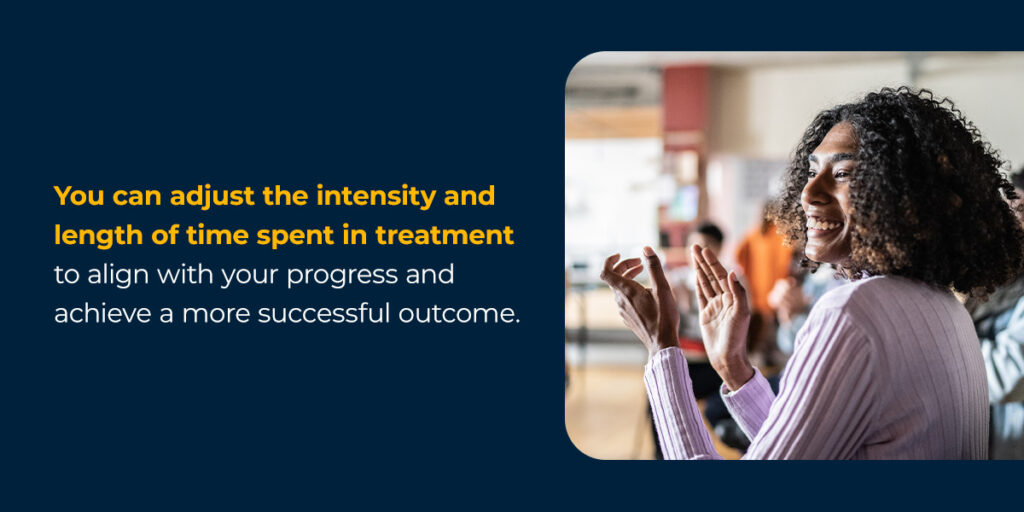- Jan 10
- Residential Treatment CenterTreatment

The recovery journey looks different for everyone. Some patients are back on track within a month, while others can benefit from a longer and more comprehensive treatment program. Depending on your specific situation, you can stay in treatment longer than the typical 30 days.
Discover the typical lengths of stays for each level of addiction care and other services that can support your long-term recovery.
How Long Can You Stay in Rehab?
Most patients stay in inpatient or residential treatment for at least one month, though the exact length will depend on the treatment center and your specific needs. Residential care allows you to stay in a safe, controlled environment while receiving 24/7 medical supervision and support. While most inpatient programs range from a few weeks to a few months, long-term programs can last up to six months.
Before beginning treatment, you’ll work with an addiction specialist to determine the best program duration to address your unique needs. Here are a few factors that could influence your decision to stay in rehab longer than 30 days.
- Severe drug addiction: Many patients stay in residential treatment longer than 30 days because they’re dealing with a long-term substance use problem and require additional time to alleviate withdrawal symptoms.
- Co-occurring health conditions: A dual diagnosis of substance use disorder and a mental health challenge like depression, post-traumatic stress disorder, or anxiety can significantly influence your recovery. Treating addiction requires addressing all aspects of the condition, and dual-diagnosis services can offer you more time to confront both.
- Lack of social support: Many patients enter residential care to escape a triggering home environment. With 24/7 support, they can better focus on their recovery and stay safe from substances and relapse.
- No signs of improvement: After you complete your initial rehab program, health providers will assess your progress to determine if you might benefit from a longer stay. They will also make adjustments throughout your program to better target your needs for a more effective treatment.
Due to advancements in mental health research and medically assisted treatment, the care you receive is more flexible than ever. You can adjust the intensity and length of time spent in treatment to align with your progress and achieve a more successful outcome.

How Outpatient Treatment Fits Into the Equation
For more mild cases of addiction or short-term substance use, outpatient treatment is the less intensive alternative. Features include the following.
- Flexible care: Patients who enter outpatient treatment can continue their work, school, and home responsibilities while receiving lifesaving care. The flexibility allows you to adjust how frequently you attend treatment sessions and how long you follow your program.
- Step-down approach: Outpatient programs can last from a few weeks to one month, though many people continue receiving ongoing outpatient treatment to participate in support groups and individual counseling sessions. For this reason, you may attend inpatient treatment before transitioning to an outpatient program as a step-down approach to care.
Outpatient care can help you transition more easily into your everyday routine. It can also be a helpful source to turn to in tough times. You’ll find a support group of like-minded peers who can offer tips to navigate life after treatment and help prevent relapse.
Other Types of Treatment That Can Help Support Sobriety
Addiction recovery is a lifelong journey that requires continual effort. You must be willing to put in the work by addressing all aspects of your situation. A comprehensive program can help you break the cycle of addiction while teaching you valuable skills to help you maintain your sobriety afterward. Here are a few treatments you can take advantage of during and after a 30-day program.
Behavioral Therapy
Cognitive and dialectical behavioral therapy are evidence-based methods to support you in your addiction recovery. Both require you to make healthy life changes and examine the negative emotions and behaviors that might have contributed to your substance use disorder. Behavioral therapy can help you identify the people, places, and situations that may trigger substance use and develop beneficial coping mechanisms. Strategies can include mindfulness meditation, breathing exercises, and healthy hobbies to curb cravings and reduce the chance of relapse.
Individual and group therapy sessions can also determine whether you have co-occurring conditions like depression and anxiety. Health providers can prescribe medications and offer valuable skills to help you manage symptoms, increasing your chances of a successful recovery.
12-Step Support
The 12-step approach is a cornerstone of many addiction treatment programs. Groups like Alcoholics Anonymous and Narcotics Anonymous emphasize personal responsibility, peer support, and spiritual growth to aid in your recovery. With each meeting, you’ll acknowledge any setbacks, celebrate successes, and learn self-improvement tips.
Sessions offer a safe space to share your experiences and gain strength from others’ journeys. The connections you make in these meetings can encourage your abstinence and significantly impact your overall mental health and recovery.
Sober Living Home
Many sober living homes offer extended programs of a year or more. You can live in a stable, homelike environment surrounded by others who are pursuing similar goals. A sober living home can help you change your lifestyle by gradually transitioning between treatment and your everyday routine, while steering clear of the people, places, and things that might represent roadblocks to your well-being and stability.
Sober living homes foster community, accountability, and structure, helping you develop coping mechanisms and essential life skills. They often serve as a bridge between a 30-day inpatient program and a full reintegration into society, aiming to reduce your risk of relapse. These homes are especially beneficial for anyone who lacks a stable home environment or has a history of setbacks, offering a safe space for people to commit to achieving and maintaining a substance-free life.
Alumni Community
At Gateway Foundation, we offer alumni community services to aid in your ongoing recovery, including relapse prevention support, meetings, and educational programming. We encourage every Gateway Foundation graduate to take advantage of our alumni programs, as they can help you form sober relationships that will last a lifetime.
We have integrated mobile apps into our care models so alumni can take their support network anywhere. Connect to Gateway and our community with text alerts and stay up to date on the latest meeting reminders and events. Alumni support services ensure you always have someone on your side, whether you need advice to manage cravings or suggestions for avoiding triggers. At Gateway, we are with you for life, providing the structure you need for lasting recovery.
Get Comprehensive Care at Gateway Foundation
Staying longer than the typical 30-day treatment program can offer many benefits. Gateway can help if you need additional support or require resources for a smoother transition home. We offer various evidence-based treatments and aftercare programming to address your unique situation and help you achieve and maintain a substance-free lifestyle.
To learn more about our addiction programs and services, contact us today.



